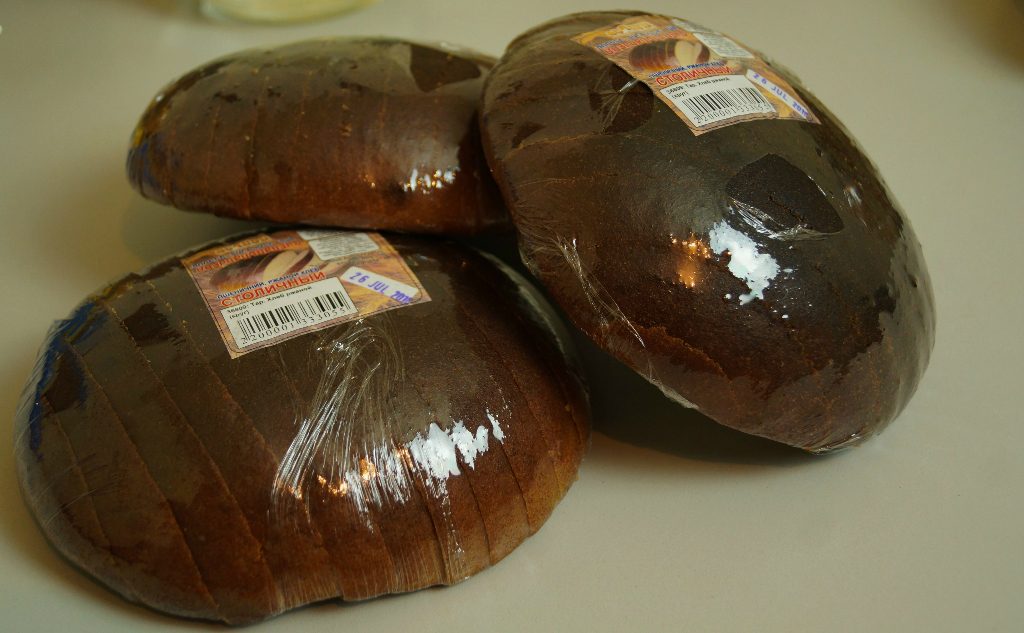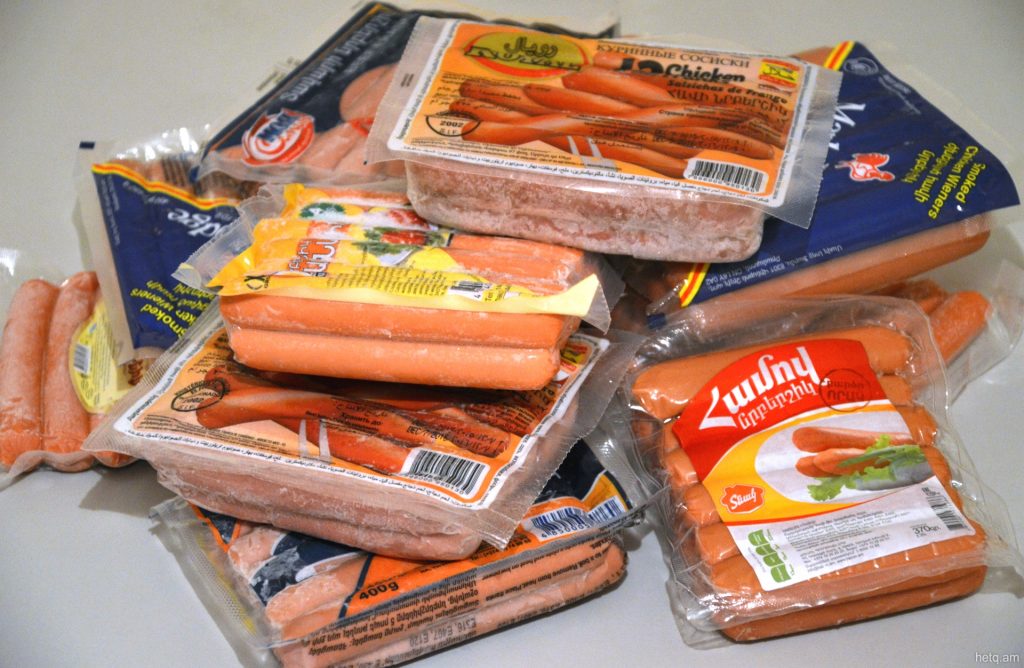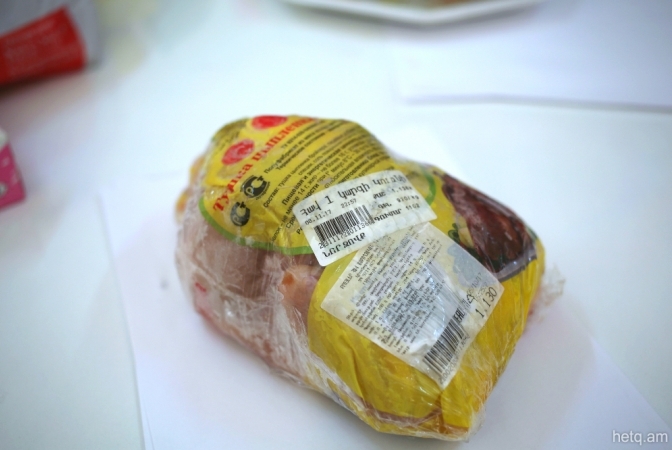“Spotlight on Our Media” is a special series for the Armenian Weekly highlighting the work of local journalists covering in-country issues.

In the summer of 2016, journalist Tatev Khachatryan made a simple, yet startling observation: The abundance of rye bread in Armenia’s supermarkets did not align with the availability of its main ingredient, rye flour. Only 1.2 tons of rye flour were imported into the country from 2010 to 2015. That number, she learned, was hardly enough to sustain the consumption of rye bread for even half a year.
Thus began a series of investigations for local news site Hetq.am, tackling popular food items in Armenia’s grocery stores by putting their nebulous contents to the test. Partnering with an independent accredited food laboratory in Yerevan, Khachatryan has published articles exposing food-safety violations from all aisles of the grocery store. Her first work revealed the nation’s “counterfeit” rye bread industry.
In the year-and-a-half since her first story, she has covered everything from ice cream and bottled water to—most recently—frozen chicken, and she doesn’t intend to stop anytime soon. Because although some violations were quite benign, like missing ingredients or labeling obscured by the shipping process, others were downright deadly. One study showed that the local frozen hot dog brand “Bacon Product” contained 800 times the acceptable quantity of MAFAM (one of the microbiological indicators of food product) and traces of E. coli.

Khachatryan’s articles have since been the catalyst for some of the biggest regulatory upsets over food in Armenia’s modern history, and they have even spurred some mild talk of accountability in the corporate food chain. Below is our recent interview.
***
Karine Vann: Why did you start reporting on food? Are there other journalists covering this issue in the country right now?
Tatev Khachatryan: Food is one of the most important parts of our lives, and certainly there are some publications focusing on food in our media, but Hetq is the only platform covering food-safety topics consistently and deeply for over a year now, and even breaking the news to other media outlets. The unfortunate side to this is that, in most cases, other media platforms don’t follow journalistic rules of ethics and [don’t] mention the source.
Of course, there are also public organizations in Armenia devoted to studying the food market, but their studies haven’t been as massive and influential as our investigations. I don’t know why. Maybe it’s because of the huge role of media in our era. It’s noteworthy that representatives of these organizations started giving comments and press conferences only after we published our findings.
In short, I can proudly say that due to our work the head of State Food Safety Service (SFSS) was fired by the end of 2016; Prime Minister Karen Karapetyan issued food-safety directives; many wrong labels were changed; standards for the Eurasian Conformity mark were added; some dangerous products were recalled; and, in general, consumers have become more attentive and demanding.
K.V.: Are there other organizations funding your studies outside of Hetq?
T.K.: As we decided to cover food issues consistently and the research was not very cheap, and Hetq had no sponsors and financial levers such as ads on our website or donations, we submitted an application on covering this topic to the the National Endowment for Democracy (NED), which offered to allocate funds to this program.
K.V.: How have people generally reacted to your stories? Do they feel hopeful or discouraged by your reporting?
T.K.: Stories about food are always suсcessful. They are read, shared, liked, and commented on. For example, these articles (at least two of them) were at the top five most read articles on Hetq (both in 2016 and 2017).
I guess the pessimists get discouraged, responding with things like, “Excellent, now there is nothing to eat,” “So what?” “Is this a commissioned article?” or “Don’t scare people, still nothing will change in this country,” etc., etc. But optimists feel hopeful because they feel there’s a public media organization (Hetq.am, “Investigative Journalists of Armenia”) working on their behalf, which cares about what they and their children eat. People also began places more attention on product labels. They started reporting and sending photos of wrong labels․ For example, the article about Iranian dried fruits was published due to a report from one of Hetq’s readers. I don’t know if I can fully measure the “index” of hopefulness or discouragement of people. But, in the end, awareness from both “pessimists” and “optimists” has increased.
K.V.: As they appear to be very important to Armenia’s food industry, how would you best explain “GOST” standards? Does Armenia have its own separate standards?
T.K.: GOST are the standards which “came to us” from the times of the Soviet Union. Companies produced their products according to them. Those standards were strict enough that, even until now, people perceive GOST as a mark of quality. Armenia also has its own Armenian Standards and can follow them while producing some products for the local market. But most GOST standards were formed on the basis of the customs regulations in Eurasian Economic Union (EAEU). And Armenia follows these regulations.

K.V.: How many representatives from companies which have failed your lab tests have reached out to you to make amends? Have you reached out to any manufacturers for statements?
T.K.: The companies that reached out to Hetq can be counted on the fingers of one hand. SPK Kurnikov is one of many companies that turned to us, announcing that they would study their product in the other laboratories to find out of it had problems or not. Later, this company performed other tests which didn’t find any violation; but, as we noticed, the testing was conducted according to the wrong standards.
The company Syuniki Barikner company, which produces Marila cottage cheese, also turned to us and its consumers, stating that they would take actions to find out the reasons for the published violations. Another company, Bacon Production, reached out to us, but complained that we had tried to ruin their reputation as a business. We published their answer and gave them a response. There were also several angry calls from bread producers.
Recently, Araks Poultry Plant turned to us to repeat the same batch product testing (Grade A frozen broilers) in two different laboratories. The results will be published as soon as we get them. The others (and as you can see, they were quite a lot) didn’t try to contact us or even somehow explain the situation to the people, to their consumers. Hetq doesn’t cooperate with any company, but we are always open to listening to others’ opinion and discussing problems to find out the right solutions.
K.V.: What do you think is the long-term solution to this problem? Should the change come from above (more and more regulation) or below (consumers should try to invest in companies that produce locally and ethically)?
T.K.: We have enough regulations, levers, and budgets to be able to control the food market in Armenia. We even have even a special governmental organization (the SFSS). But, as we can see, it’s not a guarantee that we are eating food that is safe. That’s why I think the long-term solution of this problem is aware and responsible consumers. There will always be unscrupulous producers and bribed state employees. The aim of Hetq’s publications is not just to make people aware about what products are dangerous or what products they should be eating, but also, to be demanding more from their governmental organizations, which exist at the expense of taxpayers but are not actually functioning.
K.V.: How did you end up in this profession?
T.K.: When I was a child, I thought that my mission was to make the world better. By about the 8th grade, I realized I could “change the world” with journalism. Since then, I’ve graduated from both Yerevan State University and Moscow State University with degrees in journalism.
As I grew older, the romantic ideas I had about my mission became more realistic, and I began to understand that I should begin changing the world starting with my country, Armenia. So I began by covering local, but serious problems. Hetq gave me that chance. As a staff reporter, I’ve worked at Hetq since Aug. 2014, but I’ve been writing articles for them since I was a student, in 2012. I can safely say that due to journalism and Hetq, I’ve changed some things that may be very small for the world but are important for my country.

7 Comments To "Next Time You’re in Armenia, Beware the Frozen Hot Dogs"
#1 Comment By Mary Mherian On February 14, 2018 @ 1:26 pm
Good job Tatev, Thank you so much for your research, and this article. I have been visiting Yerevan twice a year from 2014 on, and have had some bad experience with packaged meat products, I myself do not eat processed food that much, but on my last visit to Yerevan in November 2017, I took my two dogs (Italian Greyhounds) with me to Armenia, I noticed that my dogs did not eat the so called American Style Hod – dogs that I actually purchased for myself to eat, I end up feeding the hod-dogs to street dogs.
#2 Comment By Stewart Brewster On February 14, 2018 @ 1:28 pm
To counter misleading product labeling/marketing, penalties must
go well beyond product recall. Consequences have to be severe to counter (criminal) capitalists. Prosecution, fines and even imprisonment is necessary to make an example of those who shorten the life of innocent consumers, especially children, the elderly and the infirm. Ultimately the goal of government and the medical community must be to aggressively promote consumption of nutritional natural food (i.e whole-plant based eating) and avoid processed food. Cucumbers, beets, whole grains, spinach potatoes, squash, beans, corn and eggs do not need labels.
#3 Comment By Maro Badiguian-Shirvanian On February 14, 2018 @ 3:04 pm
I’m very happy that you are doing investigative job on food products in Armenia! I live in Canada, and I’m a health-oriented person. I, stricly, follow the ingredient list on food products, and packages. I encourage you to continue your very important mission! I would like the citizens of my homeland to have safe food to consume! Very good job done Tatev! Continue your wonderful investigation! God bless you!
#4 Comment By Robert On February 14, 2018 @ 4:19 pm
Bravo a very good subjected article. I am absolutely and totally disappointed that the government has allowed (either being aware or unaware) this sort of manipulative food productions to go without any investigative methods or control in Armenia. Shame on those authorities to have closed their eyes to such pathetic manipulation in the food industry. Surely somebody MUST BE HELD RESPONSIBLE. Wishing the investigator all the very best in uncovering more disgusting methods of food production. The Government and any responsible authority should be pulled into line and consider the health and the well being of the people of Armenia first. Prosecute those who do not take this matter seriously. This is disgusting.
#5 Comment By Yerevanian On February 14, 2018 @ 5:39 pm
Actually, back in January, I ate a couple of hot dogs at a greasy spoon while driving from Yerevan to Vanadzor. They were actually pretty good.
#6 Comment By tlkatintsi On February 14, 2018 @ 7:37 pm
Thanks to Hetq for the coverage. Keep up the good work!
#7 Comment By Anon On February 16, 2018 @ 10:51 pm
Re: Mary Mherian’s comment: Here’s all you need to know about the Armenian diaspora and why Armenian-Armenians don’t have much respect for you. You visit Yerevan (not Armenia) twice a year for three years and then feel qualified to comment on everything “Armenian.” Sorry about your designer dog’s diet. I know many Armenians who eat that processed crap all of the time because they can’t afford anything else. And, you said it all when you said “American Style” “hod (sic)-dogs.” The U.S. has sold the idea of processed foods, Pizza Hut, Kentucky Fried Chicken, fast food, and U.S. ‘culture’ for all of its 25 years of “service” here. Next time, just send the money; you stay wherever your home is.